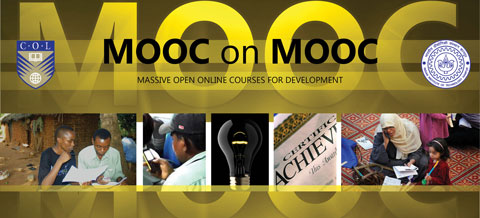
A massive open online course (MOOC) on the topic of MOOCs, titled “MOOC on MOOC” was offered jointly by the Continuing Education Centre, Indian Institute of Technology Kanpur (IITK), and the Commonwealth of Learning (COL) with the Technical Education Quality Improvement Programme (TEQIP) during the fall of 2014.
The course explored key concepts, methods and practices in the MOOC paradigms and was appropriate for both a non-technical and technical audience. It had an enrolment of 2,344 participants from 91 countries (1,688 participants were characterised as active based on volume of activity). In total, 310 participants earned a certificate of participation and among these, 111 participants earned a certificate of competence.
Design and delivery
 The course was run on a beta version of the mooKIT platform, designed by IITK. This platform is customisable, low cost to run and scalable. Combined with an aesthetically appealing interface and intuitive navigation, the platform is now used in other courses with which COL is associated, such as those under the AgMOOCs initiative.
The course was run on a beta version of the mooKIT platform, designed by IITK. This platform is customisable, low cost to run and scalable. Combined with an aesthetically appealing interface and intuitive navigation, the platform is now used in other courses with which COL is associated, such as those under the AgMOOCs initiative.
The course covered topics such as sustainable development, instructional design and computer hardware. The eclectic nature of the content was of value to participants from a variety sectors. The varied places/countries of origin of instructors and participants were of value to participants with reference to experiencing a range of perspectives and contextualisation of content. The instructional design benefited from multiple pathways for communication between instructors and participants and from timely responses from instructors.
Welcome and mooKIT Tour
The MOOC Landscape (Week 1)
- What is a MOOC?
- Taxonomy/Ecology
- History of the MOOC
- Why institutions and teachers offer MOOCs
- How did MOOCs come about?
- MOOC comes about: a predecessor
- What is inside a MOOC?
Architecture of a MOOC (Week 2)
- Video lectures, best practices, and content
- Interactions
- Identity
- Assessment
- Analytics
- Certification
- Event management
What does it Cost to Run? (Week 3)
- Quality Issues
- Quality Attributes of a MOOC Platform
- NPTEL
- NPTEL online courses and certification
- Massively empowered classrooms
- Course Builder
- The studio at IITK
- Do it yourself recording for MOOCs
- MITx – the learning revolution
MOOC Platforms (Week 4)
- Flipped Classroom
- MOOC Platforms: MOOConomics Business Models
- Future Learn
- Coursera, edX, Udacity
- mooKIT
- Low Bandwidth Scenarios
- China Online
- MOOC by design
- Who are the learners in MOOCs?
How to Run a MOOC (Week 5)
Conclusion
Similar to COL’s MOOC on Mobiles for Development, the MOOC on MOOC, offers another approach under the MOOC for Development paradigm. The idea of replicating the university experience to satisfy intellectual curiosity or to pursue a credential is not the focus of these courses. Instead, these MOOCs provide training and skill development with the intent of participants being able to apply knowledge and skills to solve pressing issues primarily in the space of sustainable development.
The Massive Open Online Course (MOOC) on MOOCs: Course Evaluation can be found on COL’s Open Access Repository.


